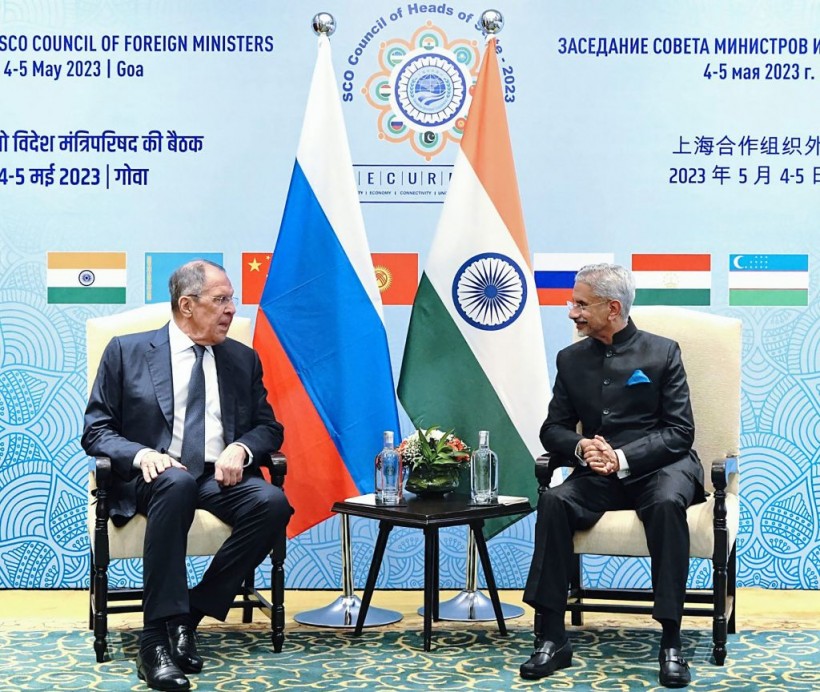
This handout photograph taken on May 4, 2023, and released by the Indian Ministry of External Affairs shows India's Foreign Minister Subrahmanyam Jaishankar (R) speaking with his Russian counterpart Sergey Lavrov on the sidelines of the Shanghai Cooperation Organization (SCO) Council of Foreign Ministers' meeting in Benaulim.
As a result of a growing trade imbalance with the South Asian country, Russian banks have amassed billions of rupees that the country is unable to spend, Foreign Minister Sergei Lavrov said on Friday, May 5.
At a press conference on the sidelines of a Shanghai Cooperation Organization summit, Lavrov expressed concern about this issue to the reporters in India's western state of Goa. "We need to use this money. But for this, these rupees must be transferred in another currency, and this is being discussed now."
Surge in Imports
According to figures from the Ministry of Commerce and Industry, India's overall exports to Russia fell by 11.6% to $2.8 billion in the first 11 months of the 2022 and 2023 financial year, while imports increased by almost fivefold to $41.56 billion. In a report by Bloomberg, this increase is because Indian refineries have been buying up heavily discounted Russian oil that the West has been avoiding buying in the wake of President Putin's invasion of Ukraine.
In April, India imported a record 1.68 million barrels of Russian oil per day, which is a six-fold increase from the same month a year ago, as reported by Vortexa Ltd, a data intelligence organization.
After sanctions were imposed on Russian banks and transactions via the SWIFT messaging system were forbidden, the Kremlin originally urged India to trade in national currencies.
Plans for a rupee-ruble arrangement for oil imports were scrapped due to the instability of the ruble in the early stages of the conflict.
See Also: Russia, Ukraine, Turkey, UN to Discuss Ukrainian Grain Exports Across Black Sea
Inaccessible Funds
Alexander Knobel, head of the Institute of International Economics and Finance at the Ministry of Economic Development, estimates that the sum of frozen funds may reach tens of billions of dollars due to the trade imbalance between Russia and other countries.
"The situation is aggravated by India's historically high aggregate trade deficit, which reduces the possibilities of clearing settlements with third countries."
While Russia is India's primary source of military hardware, transactions between the two countries have halted due to the absence of a payment channel that does not contravene US sanctions.
For almost a year, over $2 billion in Indian payments for weapons have been frozen because Russia is unable to take rupees for purchases, and New Delhi is hesitant to pay in dollars for fear of secondary penalties.
Oil refineries in India have been attempting to pay for affordable crude in UAE dirhams, Russian rubles, and Indian rupees. To avoid international restrictions, companies must ensure that their transactions do not exceed $60 per barrel. This ceiling was established by the G7 nations and their European Union allies.
In order to simplify international commerce in rupees and maintain crude oil exports, Indian banks, notably Sberbank PJSC and VTB Bank PJSC, created special vostro accounts in Russian financial institutions.
Unfortunately, Bank of Russia Governor Elvira Nabiullina stated that Russian exporters had trouble repatriating rupees due to currency limitations.
See Also: White House: Russia's Accusation of US Involvement in Kremlin Drone Attack 'Ludicrous'








